英语时间状语从句
高中英语语法时间状语从句讲解
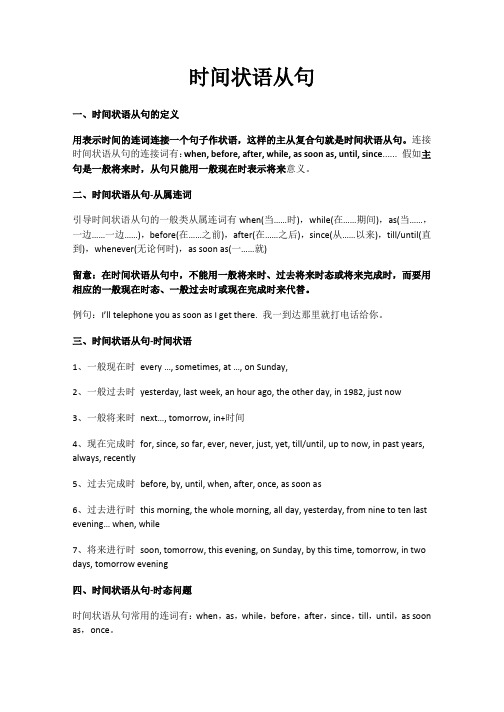
时间状语从句一、时间状语从句的定义用表示时间的连词连接一个句子作状语,这样的主从复合句就是时间状语从句。
连接时间状语从句的连接词有:when, before, after, while, as soon as, until, since...... 假如主句是一般将来时,从句只能用一般现在时表示将来意义。
二、时间状语从句-从属连词引导时间状语从句的一般类从属连词有when(当……时),while(在……期间),as(当……,一边……一边……),before(在……之前),after(在……之后),since(从……以来),till/until(直到),whenever(无论何时),as soon as(一……就)留意:在时间状语从句中,不能用一般将来时、过去将来时态或将来完成时,而要用相应的一般现在时态、一般过去时或现在完成时来代替。
例句:I’ll telephone you as soon as I get there. 我一到达那里就打电话给你。
三、时间状语从句-时间状语1、一般现在时every …, sometimes, at …, on Sunday,2、一般过去时yesterday, last week, an hour ago, the other day, in 1982, just now3、一般将来时next…, tomorrow, in+时间4、现在完成时for, since, so far, ever, never, just, yet, till/until, up to now, in past years, always, recently5、过去完成时before, by, until, when, after, once, as soon as6、过去进行时this morning, the whole morning, all day, yesterday, from nine to ten last evening… when, while7、将来进行时soon, tomorrow, this evening, on Sunday, by this time, tomorrow, in two days, tomorrow evening四、时间状语从句-时态问题时间状语从句常用的连词有:when,as,while,before,after,since,till,until,as soon as,once。
状语从句(9种全)
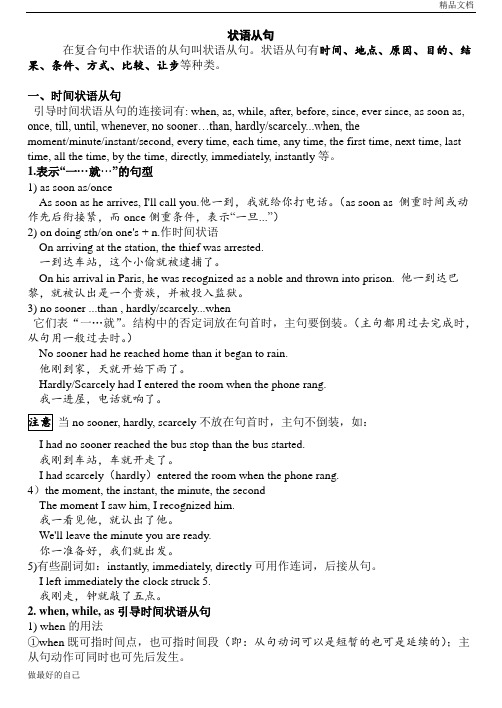
状语从句在复合句中作状语的从句叫状语从句。
状语从句有时间、地点、原因、目的、结果、条件、方式、比较、让步等种类。
一、时间状语从句引导时间状语从句的连接词有: when, as, while, after, before, since, ever since, as soon as, once, till, until, whenever, no sooner…than, hardly/scarcely...when, themoment/minute/instant/second, every time, each time, any time, the first time, next time, last time, all the time, by the time, directly, immediately, instantly等。
1.表示“一···就···”的句型1) as soon as/onceAs soon as he arrives, I'll call you.他一到,我就给你打电话。
(as soon as 侧重时间或动作先后衔接紧,而once侧重条件,表示“一旦...”)2) on doing sth/on one's + n.作时间状语On arriving at the station, the thief was arrested.一到达车站,这个小偷就被逮捕了。
On his arrival in Paris, he was recognized as a noble and thrown into prison. 他一到达巴黎,就被认出是一个贵族,并被投入监狱。
3) no sooner ...than , hardly/scarcely...when它们表“一…就”。
结构中的否定词放在句首时,主句要倒装。
时间状语从句 英语

时间状语从句英语
时间状语从句是指用来表示时间关系的从句,通常由when, while, as, before, after, since, until, as soon as等连词引导。
它可以放在主句前面或后面,用来说明主句中的动作发生的时间。
例如:
- When I was young, I used to play basketball every day.(当我年轻的时候,我每天都打篮球。
)
- After I finish my homework, I will go to bed.(我做完作业后,就去睡觉。
)
- Since he left, I haven't seen him again.(自从他离开后,我再也没有见过他。
)
- As soon as she arrived, we started the meeting.(她一到,我们就开始了会议。
)
需要注意的是,时间状语从句中的动词通常要使用一般过去时或完成时,而主句中的动词则要根据具体情况来确定时态。
初中英语知识点归纳时间状语从句的引导词和结构
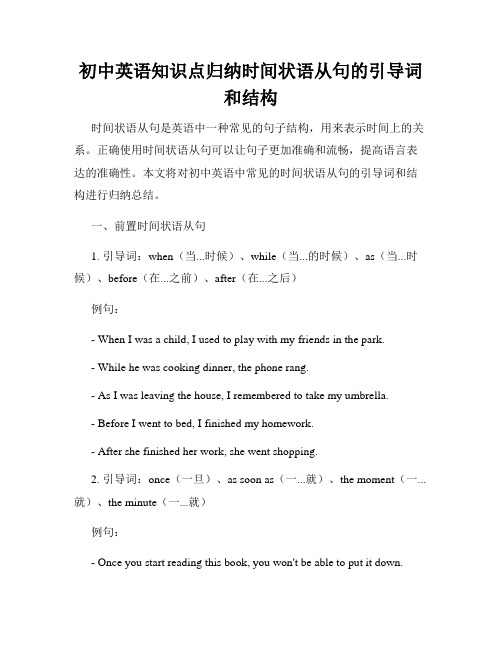
初中英语知识点归纳时间状语从句的引导词和结构时间状语从句是英语中一种常见的句子结构,用来表示时间上的关系。
正确使用时间状语从句可以让句子更加准确和流畅,提高语言表达的准确性。
本文将对初中英语中常见的时间状语从句的引导词和结构进行归纳总结。
一、前置时间状语从句1. 引导词:when(当...时候)、while(当...的时候)、as(当...时候)、before(在...之前)、after(在...之后)例句:- When I was a child, I used to play with my friends in the park.- While he was cooking dinner, the phone rang.- As I was leaving the house, I remembered to take my umbrella.- Before I went to bed, I finished my homework.- After she finished her work, she went shopping.2. 引导词:once(一旦)、as soon as(一...就)、the moment(一...就)、the minute(一...就)例句:- Once you start reading this book, you won't be able to put it down.- As soon as the bell rang, the students rushed out of the classroom.- The moment she saw him, her face lit up with joy.- The minute I arrived at the station, the train left.二、后置时间状语从句1. 引导词:when(当...时候)、while(当...的时候)、before(在...之前)、after(在...之后)、until/till(直到...的时候)、since(自...以来)例句:- I will call you when I arrive at the airport.- She likes to listen to music while she's doing homework.- I went to bed before it started raining.- After she finished her meal, she paid the bill and left.- He didn't speak up until/till the end of the meeting.- Since you have been away, many things have changed.2. 引导词:once(一旦)例句:- You will succeed once you put enough effort into it.三、并列时间状语从句1. 引导词:when(当...时候)、whenever(无论何时)、while (当...的时候)、as(当...时)例句:- You can come to my house when you have time.- Whenever I see a dog, I can't help but smile.- While I was reading a book, my brother was watching TV.- As she was walking in the park, she saw a beautiful flower.2. 引导词:before(在...之前)、after(在...之后)例句:- I will finish my homework before I go out to play.- After she finished her lunch, she went for a walk.以上是初中英语中常见的时间状语从句的引导词和结构的归纳总结。
初中状语从句

初中英语知识点归纳:状语从句一时间状语从句1.时间状语从句表示时间,引导词有:when, while, as, till, until before, after, since等。
时间状语从句的引导词所表示的意思不尽相同,要注意把握不同引导词所表示的不同时间关系,以及它在具体句子中对应的时态、语态等问题。
注意:as(在……时候,因为),since(自从,因为),它们可以引导时间从句,并强调主句和从句的动作同事发生。
并且while有时还可以表示对比。
例如:(1)While my mother was reading the newspaper, I was watching TV.(read是延续性的动词,read和watch同事发生)I like playing football while you like playing basketball.我喜欢踢足球,而你喜欢打篮球。
(对比)(2)when(当……的时候),引导的从句的谓语动词可以是延续性动词,也可以是瞬间动词。
从句动作可与主语动作同事发生,也可在其后发生。
I was reading a book when she came into my room(come是瞬间动词,只能用when引导,不能用while)I often missed my home when(while) I lived in New York.(live是延续性动词,when可用while代替)(3)when和while的区别还在于:while引导的时间状语从句多用于进行时态,而when引导的时间状语从句多用于一般时态。
While they were talking, the bell rang.正在他们谈话的时候,上课铃响了。
(4)as译作“一边……一边”、“随着……”,侧重主句和从句的动作同时发生。
有时可与when,while通用。
We always sing as we walk.我们总是边走边唱。
时间状语从句的用法及常见错误

时间状语从句的用法及常见错误时间状语从句,是英语中的重要语言结构之一,相信很多学习英语的同学们都有接触过。
它的作用是在主句中描述时间,常常是表达事件发生的先后顺序。
然而,由于语法结构的复杂性以及细节的繁琐,使得许多学习者在真正应用时出现了一些常见的错误。
本文旨在介绍时间状语从句的用法及常见错误,帮助读者加深对此语法结构的理解,更好地运用它。
一、时间状语从句的用法时间状语从句指的是在主句中用来描述时间顺序或时间点的句子,通常由连词when、while、as、before、after、since、until等引导。
例如:- When I arrived at the station, the train had already left.- While I was walking in the park, I met an old friend.- After I finish my homework, I will go to bed.时间状语从句也可以放在句首、句中、句末等不同位置,需要根据语境进行灵活运用。
例如:- When I was young, I used to play football every day.- I met an old friend while I was walking in the park.- I will go to bed after I finish my homework.此外,时间状语从句与各种时态、语态和情态动词搭配使用。
具体来说:1. 在一般现在时中,时间状语从句中通常使用一般过去时来表示过去的时间点或延续时间:- I always watch TV when I have free time.- He speaks Chinese fluently as he has been learning it for many years.2. 在一般过去时中,时间状语从句中通常使用过去完成时来表示更早的过去时间点或动作的完成:- After she had finished her homework, she went to bed.- When I arrived at the airport, the plane had already taken off.3. 在一般将来时中,时间状语从句中通常使用一般现在时或一般将来时来表示将来的时间点或延续时间:- I will call you as soon as I arrive in Shanghai.- She will be very happy when she sees the gift.4. 在现在完成时中,时间状语从句中通常使用过去时间来表示已经完成的动作:- She has visited many countries since she graduated from university.- I haven’t seen him since we went to school.5. 在情态动词中,时间状语从句中通常使用过去完成时来表示动作的完成:- He should have arrived by now.- I would have finished the task if I had more time.二、时间状语从句的常见错误尽管时间状语从句的知识点看似简单,但在实际应用中却存在一些常见错误。
初中英语知识点归纳时间状语从句的引导词和构成

初中英语知识点归纳时间状语从句的引导词和构成时间状语从句是英语语法中的重要部分,它用来描述一个动作或事件发生的时间。
在句子中,时间状语从句通常由引导词引导。
本文将对初中英语中时间状语从句的引导词和构成进行归纳总结。
一、引导词的分类1. 引导从句表示时间点的引导词:when,while,as soon as,once,before,after,since,till/until,as,no sooner...than等。
例如:- I always feel sleepy when I study late at night.(我晚上学习到很晚时总是感到困倦。
)- Maggie was doing her homework when the phone rang.(电话响起时,Maggie正在做作业。
)- As soon as I finish this book, I will lend it to you.(一旦我完成这本书,我就会借给你。
)2. 引导从句表示时间段的引导词:while,when,as,as long as,once,whenever等。
例如:- I will stay here as long as you need my help.(只要你需要我的帮助,我就会一直呆在这里。
)- Whenever you come to Beijing, please let me know.(无论什么时候你来北京,请告诉我。
)3. 引导从句表示相对时间的引导词:before,after,since,until/till,while等。
例如:- I had a shower before I went to bed.(我在睡觉前冲了个澡。
)- They had been waiting for the bus since three o'clock.(他们从三点钟开始就一直在等公交车。
)- Please wait here until/till I come back.(请在这里等我回来。
时间状语从句例句

时间状语从句例句在英语语法中,时间状语从句是一个非常重要的语法结构,它可以用来描述事件发生的时间顺序或者前后关系。
时间状语从句通常由连词引导,如when(当…时)、while(当…时)、before(在…之前)、after(在…之后)、since(自从…以来)等等。
下面将给出一些时间状语从句的例句,希望能帮助大家更好地理解这一语法结构。
1.When I was a child, I used to play with my friends every day afterschool.2.While I was cooking dinner, my phone suddenly rang.3.Before she left for work, she made sure all the windows were closed.4.After he finished his homework, he went out to play basketball withhis classmates.5.Since we moved to this new neighborhood, we have made a lot of newfriends.6.Whenever I visit my grandparents, they always prepare my favoritedishes.7.As soon as the rain stopped, we went out for a walk in the park.8.Once he saw the movie, he couldn’t stop talking about it for days.9.Until the last minute, we didn’t know if the event would be canceleddue to the bad weather.10.Even though she had studied hard, she still couldn’t pass the exam.以上是一些时间状语从句的例句,通过不同的连词引导,可以表达出不同的时间关系。
完整版)状语从句(9种全)

完整版)状语从句(9种全)状语从句在复合句中起到修饰主句的作用,分为时间、地点、原因、目的、结果、条件、方式、比较、让步等种类。
1.时间状语从句时间状语从句的连接词包括when。
as。
while。
after。
before。
since。
ever since。
as soon as。
once。
till。
until。
whenever。
no sooner…than。
hardly/scarcely。
when。
the moment/minute/instant/second。
every time。
each time。
any time。
the first time。
next time。
last time。
all the time。
by the time。
directly。
immediately。
instantly等。
例如,“一···就···”的句型可以用as soon as或once引导,其中as soon as侧重时间或动作先后衔接紧,而once侧重条件,表示“一旦。
”;on doing sth/on one's + n.作时间状语,例如On arriving at the n。
the thief was arrested.意为“一到达车站,这个小偷就被逮捕了。
”2.地点状语从句地点状语从句的连接词包括where。
wherever。
anywhere。
everywhere等。
例如,I'll go wherever you go.意为“你去哪儿,我就跟你去哪儿。
”3.原因状语从句原因状语从句的连接词包括because。
since。
as。
now that。
seeing that。
considering that等。
例如,Since it's raining。
we'll stay indoors.意为“因为下雨,我们将待在室内。
时间状语从句英语语法大全

时间状语从句要点: 时间状语从句,由以下连词引导:when while as after before as soon as since till /until by the time 在时间状语从句中,要注意时态一致。
一般情况下主句是将来时的时候,从句要用一般现在时。
1.when当...的时候Mozart started writing music when he was four years old.(当)莫扎特4岁的时候,开始写音乐作品。
2.while当...时He visited a lot of places while he was traveling.他在旅途中参观了许多地方。
3.as在...的同时;一边...一边...He smiled as he stood up.他一边站起来一边笑着。
4.after在...之后He left the classroom after he had finished his homework the other day.前几天做完作业之后回的家。
5.before 在...之前Mr. Brown had worked in a bank for a year before he came here.布朗先生来这之前已经在一家银行里工作一年了。
6.as soon as 一...就...We began to work as soon as we got there.我们一到那就开始工作。
I will write to you as soon as I get home.我一到家就给你写信。
7.since 自。
以来到现在表示自过去的一个起点时间到目前(说话时间)为止的一段持续时间。
主句一般用现在完成时,从句用一般过去时。
Mr Green has taught in that school since he came to China three years ago.自格林先生来中国以来,他就在这所学校教书。
时间状语从句ppt课件

时间状语从句的省略
省略主语和助动词
当从句的主语和助动词与主句的主语一致时,从 句的主语和助动词可以省略。
省略be动词
当从句中的动词是be动词时,be动词可以省略。
省略连词
当从句和主句之间没有连词连接时,连词可以省 略。
时间状语从句的倒装
倒装句式
时间状语从句中的主语和动词的顺序可以颠倒,形成倒装句式。
总结词
表示一个动作从过去某时开始一直持续 到现在
VS
详细描述
Since通常用于描述一个从过去某时开始 一直持续到现在的动作或状态。例如: “I have been waiting since 9 o'clock.”(我从9点钟就开始等了。)
03
CATALOGUE
时间状语从句的时态搭配
现在时与过去时的搭配
时态
时间状语从句的时态要与 主句的时态相呼应,一般 遵循“主将从现”的原则 。
语序
时间状语从句通常是陈述 语序。
时间状语从句的作用与重要性
作用
时间状语从句可以用来描述动作发生的时间、持续时间或动作的先后顺序,从 而使句子更加准确和清晰。
重要性
在英语语法和写作中,正确使用时间状语从句对于表达时间关系和增强文章逻 辑性非常重要。掌握时间状语从句的构成要素和运用技巧有助于提高英语水平 和写作能力。
主句的意义和语气对时间状语从句的意义和语气有影响。例如,如果主 句是疑问句,那么时间状语从句也可能需要使用疑问语气。
主句中的特定词汇或结构可以与时间状语从句形成对照或对比,从而强 调某些信息。
06
CATALOGUE
时间状语从句的常见错误分析
混淆不同类型的时间状语从句
01
一般现在时态的时间状语从句
时间状语从句
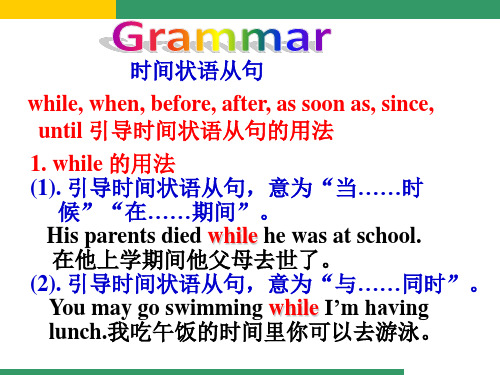
7. until的用法 (1). 介词until 表示“直到某一时刻 ;直到发 生某事” 用于肯定句中: It may last until Friday. 这可能要延续到星期五。 He will be working until 5 o'clock. 他将一直工作到五点钟。 until 用于肯定句中,表示句子的动作一直 持续到until短语所表示的时间为止,即表示 动作的终点。一般可译为“直到……时(为 止)”或“在……以前”。
(3). 若since引导的状语从句的谓语为持续性动词 的现在完成时,则表示从动作和状态发生延续 到现在(说话时刻)。 I haven’t heard from him since he has lived there。 自从他(开始)住在那儿起,我就一直没收到 他的来信。 这里has lived表示动作的持续性,时间的起点 应从:“开始居住”时算起。
(2). 连词until 表示“(直到……时为止)”
用于肯定句中 Continue in this direction until you see a sign. 一直朝着这个方向走就会看见指示牌了。 一般可译为“…直到….为止”。在这种用法中, 主句的谓语动词必须是持续动词(非瞬间动词), 如 live, wait , last, love, like, stay, work, continue 等
3. –why didn’t you help the little boy? --Oh, sorry. He had struggled to his C I ran over. feet_____ A. until B. after C. before D. since 4. He made a mistake, but then he
英语语法时间状语从句
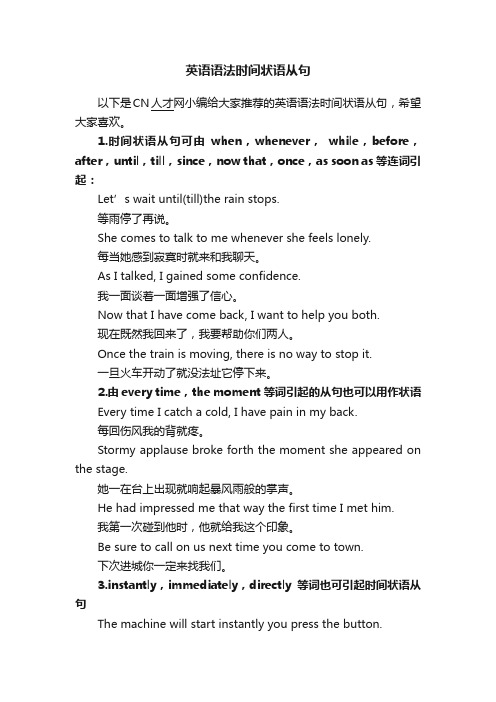
英语语法时间状语从句以下是CN人才网小编给大家推荐的英语语法时间状语从句,希望大家喜欢。
1.时间状语从句可由when,whenever,while,before,after,until,till,since,now that,once,as soon as等连词引起:Let’s wait until(till)the rain stops.等雨停了再说。
She comes to talk to me whenever she feels lonely.每当她感到寂寞时就来和我聊天。
As I talked, I gained some confidence.我一面谈着一面增强了信心。
Now that I have come back, I want to help you both.现在既然我回来了,我要帮助你们两人。
Once the train is moving, there is no way to stop it.一旦火车开动了就没法址它停下来。
2.由every time,the moment等词引起的从句也可以用作状语Every time I catch a cold, I have pain in my back.每回伤风我的背就疼。
Stormy applause broke forth the moment she appeared on the stage.她一在台上出现就响起暴风雨般的掌声。
He had impressed me that way the first time I met him.我第一次碰到他时,他就给我这个印象。
Be sure to call on us next time you come to town.下次进城你一定来找我们。
3.instantly,immediately,directly等词也可引起时间状语从句The machine will start instantly you press the button.你一按电钮机器就会开动。
时间状语从句6种用法
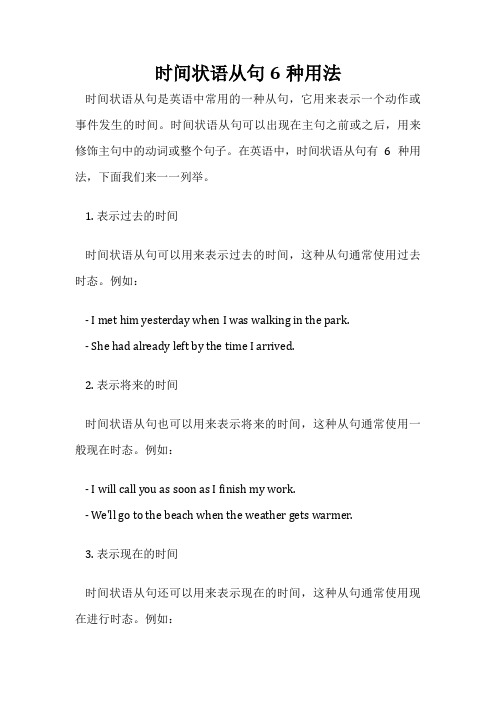
时间状语从句6种用法时间状语从句是英语中常用的一种从句,它用来表示一个动作或事件发生的时间。
时间状语从句可以出现在主句之前或之后,用来修饰主句中的动词或整个句子。
在英语中,时间状语从句有6种用法,下面我们来一一列举。
1. 表示过去的时间时间状语从句可以用来表示过去的时间,这种从句通常使用过去时态。
例如:- I met him yesterday when I was walking in the park.- She had already left by the time I arrived.2. 表示将来的时间时间状语从句也可以用来表示将来的时间,这种从句通常使用一般现在时态。
例如:- I will call you as soon as I finish my work.- We'll go to the beach when the weather gets warmer.3. 表示现在的时间时间状语从句还可以用来表示现在的时间,这种从句通常使用现在进行时态。
例如:- I am studying for my exam while my roommate is watching TV.- She is cooking dinner as we speak.4. 表示连续的时间时间状语从句也可以用来表示连续的时间,这种从句通常使用现在完成时态。
例如:- I have been working on this project since last month.- She has been studying English for three years.5. 表示条件时间状语从句还可以用来表示条件,这种从句通常使用虚拟语气。
例如:- If I had known about the party, I would have gone.- If it weren't for your help, I wouldn't have passed the exam.6. 表示顺序时间状语从句还可以用来表示顺序,这种从句通常使用现在完成时态。
时间状语从句

• As表示“一边„„一边”,as引导的动作 是延续性的动作,一般用于主句和从句动 作同时发生;as也可以强调“一先一后。 例如: • We always sing as we walk.我们总是边走
边唱。(as表示“一边„„一边”) • As we was going out, it began to snow. 当我们出门时,开始下雪了。(as强调句中两个 动作紧接着先后发生,而不强调开始下雪的特定 时间)
• 3.由till或until引导的时间状语从句。till和 until一般情况下两者可以互换,但是在强调句型 中多用until。并且要注意的是:如果主句中的谓 语动词是瞬时动词时,必须用否定形式;如果主 句中的谓语动词是延续性动词时,用肯定或否定 形式都可以,但表达的意思不同。till不可以用 在句首,而until可以放在句首。
•
• • • •
•
I didn't go to bed until(till) my father came back.直到我父亲回来我才上床睡觉。 It was not until the meeting was over that he began to teach me Englis 时间状语从句 h.直到散会之后他才开始教我英语。 I worked until he came back.我工作到他回来为止 。 I didn't work until he came back.他回来我这才 开始工作。 Please wait until I arrived.在我到达之前请等我 。
• when引导的从句的谓语动词可以是延续性的动词 ,又可以是瞬时动词。并且when有时表示“就在 那时”。 • When she came in, I stopped eating.她进来时 ,我停止吃饭。(瞬时动词) • When I lived in the countryside, I used to carry some water for him.当我住在农村时 ,我常常为他担水。(延续性的动词) • We were about to leave when he came in. 我们就要离开,就在那时他进来了。
时间状语从句

②在下列情况下,三者彼此之间不能替换使用: a.as更强调同一时间或紧接的一前一后或伴随着的变化。
eg. We listened to the singer sing as he played the guitar. 我们听着歌星边弹吉它边演唱。
I thought of it just as you opened your mouth. 你一张嘴我就知道你要说什幺
时间状语从句
引导时间状语从句的普通类从属连 词有when(当……时),while (在……期间),as(当……,一 边……一边……),before(在……之 前),after(在……之后),since (从……以来),till/until(直到), whenever(无论何时),as soon as (一……就)等。
③as表示随着
eg. As time goes on, it's getting warmer and warmer. 随着时间的推移,天气变得越来越暖了。
时间状语从句
when, while, as的用法区别
①只有当从句表示的是段时间,即其谓语动词有持续性特征时,这三者可 以通用互换。 eg. I got the news on the radio when while as I was having breakfast. 我在吃早饭的时候从收音机里获悉这一消息。
I saw Jim as when he left the meeting room. 吉姆离开会议室时候我看到了他。
英语 状语从句

状语从句一.时间状语从句:when; while; as; after; before; since; until; till; as soon as ;once ....when / while /as(一)when / while / as1. when: 1)时间状语从句,一般用词2)并列连词,强调两个动词同时性:be about to do... when / be doning...when / bejust at(on) the point of doing... when3)原因状语从句=since; now that 表示显而易见的原因2.While : 1)时间状从:从句一定要用延续性动词/ during2)表示“对比”,翻译为“但是,然而”3)表示让步;翻译为“尽管”=although4)表示条件;翻译为“只要”e.g.. While there is life, there is hope.3. as : 强调“一边... 一边”(二)before “在...之前”/ 才..../ 就....1. It was a long time before the rain stopped last night.\2. It wasn’t long before the rain stopped last night.3. It won’t be long before you catch up with your classmates.4. It will be long before you catch uup with your classmates.(三)since : 从... 时候开始1. 时态:有since做时间状语,句子用现在完成时。
但是:It has been five years since I came here .= It is five years since I came here.2. since 引导时间状语从句中:动词为延续性动词,表示动作的结束动词为短暂动词,表示动作的开始It has been five years since I became a teacher 我做老师已经5年了。
时间状语从句 time
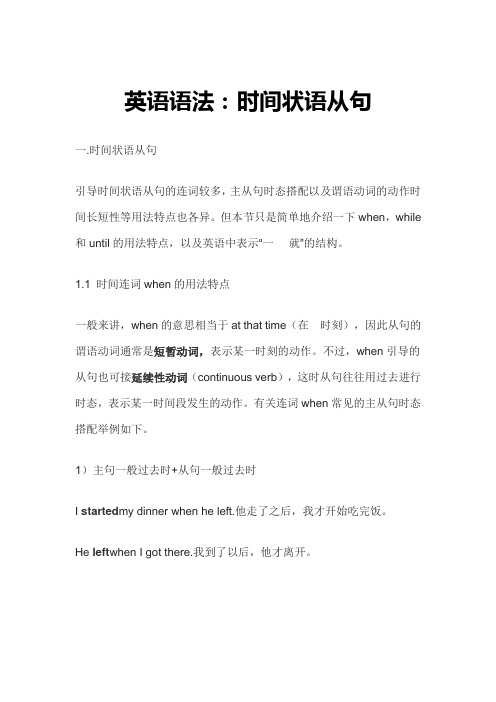
英语语法:时间状语从句一.时间状语从句引导时间状语从句的连词较多,主从句时态搭配以及谓语动词的动作时间长短性等用法特点也各异。
但本节只是简单地介绍一下when,while 和until的用法特点,以及英语中表示“一····就”的结构。
1.1 时间连词when的用法特点一般来讲,when的意思相当于at that time(在···时刻),因此从句的谓语动词通常是短暂动词,表示某一时刻的动作。
不过,when引导的从句也可接延续性动词(continuous verb),这时从句往往用过去进行时态,表示某一时间段发生的动作。
有关连词when常见的主从句时态搭配举例如下。
1)主句一般过去时+从句一般过去时I started my dinner when he left.他走了之后,我才开始吃完饭。
He left when I got there.我到了以后,他才离开。
从以上的例句可以看出,若主句用一般过去时,则表示从句动作先发生。
所以,从句还可以用过去完成时。
于是,就有了下面第二种时态搭配关系。
2)主句一般过去时+从句完成时I started my dinner when he had left.He left when I had got there.这两句的从句用了过去完成时,更强调从句动作先发生,意思上两句区别不大。
在表示过去的动作中,when引导的从句还有一个重要的时态搭配,即一般过去时(simple past)与过去进行时(past continuous)搭配。
注意:此时的时态搭配与主句。
从句没有关系,而只与动作的长短有关系。
短暂动作用一般过去时,延续性动作用过去进行时。
1.2 时间连词while的用法特点当while用作时间连词时,意思相当于during that time(在···期间),表示某一时间段发生的动作。
- 1、下载文档前请自行甄别文档内容的完整性,平台不提供额外的编辑、内容补充、找答案等附加服务。
- 2、"仅部分预览"的文档,不可在线预览部分如存在完整性等问题,可反馈申请退款(可完整预览的文档不适用该条件!)。
- 3、如文档侵犯您的权益,请联系客服反馈,我们会尽快为您处理(人工客服工作时间:9:00-18:30)。
英语时间状语从句状语从句1.时间状语从句(1)whenwhen用作并列连词(正在那时,突然)Wewereabouttostartwhenitbegantorain.IwaswatchingTVwhensomeo neknockedatthedoor.…onthepointofdoing…when…did………hadj ustdonewhen……(2)asas与延续性动词连用,侧重两个动作伴随发生,其时态一致:Ashegrewolderhelostinterestineverythingexceptgardening.Wewe rehavingbreakfastasshe________(watch)TV.(3)whilewhile“在……期间”,与延续性动词连用,和主句的动作同时发生,常用三种时态。
1.WhileIwaswaitingatthebusstop,buseswentbyintheoppositedire ction.2.Whileinprison,hewrotehisfirstnovel.3.Shoesweremende dwhileyouwaited.(4)before①before“在……之前”Ihadfinishedmypapersbeforemyteacherwentabroad.②before “过…时间之后才…”,注意使用___________和___________时态。
Theyworkedlonghoursbeforeeverythingreturnedtonormal.恢复正常Itwillbealongtimebeforewefinishthisdictionary.③还没来得及ThebellrangoffbeforeIcouldanswerit.(5)assoonas“一…就….”,directly,immediately,instantly;theinstant(that),theminute(that),thesecond(that),themoment(that)等通常都可与assoonas换用。
IrecognizedherimmediatelyIsawher.(6)…hardly...when…/…nos ooner...than…“刚……就…”,从句用过去时,主句用过去完成时。
注意倒装。
Hehadnosooner/Nosoonerhadhearrivedthanhewasaskedtoleaveagai n.Wehadhardlybegun/Hardlyhadwebegunourtalkwhenitbegantorain .(7)since从句用一般过去时,主句通常用现在完成(进行)时.We’venevermetsincewegraduatedfromthecollege.Whathaveyou beendoingsinceImetyoulasttime?Ithasbeen/is3yearssincehecame back.练习:Itwasevening______hecameback.Itwasintheevening______hecameb ack.(8)till/until“直到……时(为止)”,till不放在句首,until 多用于句首。
动词的延续性问题Tomwillremainincollegeuntil(till)hefinisheshisPh.Dcourse.肯定句Iwon’tgowithyouuntil(till)Ifinishmyhomework.否定句NotuntilIfailedintheexamdidIrealizeIshouldstudyhard.倒装ItwasnotuntilIfailedintheexamthatIrealizedIshouldstudyhard.在强调句中的倒装问题(9)whenever/eachtime/everytime/anytime“每当;每次”,可以换用。
Whenever/Everytime/EachtimeImether,shewasstudying.(10)bythe time与完成时连用Bythetime(that)thisletterreachesyou,Iwillhaveleftthecountry .Bythetimehewas10,hehadlearned10000words.Bythetimeyougetthi sletter,IwillbeinCanada.(Longman)be动词可不用完成时注意:Bythetimeheretired,WiltheldmanyNBArecords.(11)nexttime,thef irsttimeNexttimeyouseeme,Iwillhavelost10pounds.Thefirsttime Imetyou,Iknewwewouldbefriends.比较:That/It/Thisisthefirsttime(that)IhavebeentoLondon.Forthefir sttime仅用作状语(12)AfterWe’llarriveafteryouhaveleft.2.地点状语从句(1)whereWherethereisawill,thereisaway.含有条件意味IfoundmybookswhereIhadleftthem.注意:where除指具体地点外,还可表处境等抽象意义。
Hesaidhewashappywherehewas.处境很满意It’syourfau ltthatsheiswheresheis.她落到今天这个地步都怪你。
(2)wherever=everywhere,anywhereWherever(Everywhere/Anywhere )theywent,theexpertswerewarmlywelcomed.Makeamarkwhereveryou haveanyquestions.区别与其引导定语从句Bamboosgrowbestinthesouthwhereit’swetandrainy.3.原因状语从句(1)becausebecause表示直接的原因或理由,着重点在从句。
用于回答why问句,语气最强。
强调句中用because。
被simply,just,only 修饰时用because。
Ididn’tgoabroadwithherbecauseIcouldn’taffordit.Justbecaus eIdon’tcomplain,peoplethinkI’msatisfied.Itwasbecausehismotherwasillthathedidn’tcometoschool.小结:because1._______2._________3._________4.__________(2)as因为,由于Asyouwereout,Ileftamessage.(3)since通常是双方已知信息,从句多位于主句之前。
Sinceyouwon’thelpme,I’llasksomeoneelse.(4)now(that)“因为,既然,由于”,通常可以和since换用。
其中that可省去,原因往往是已变化的情况。
Now(that)you’vepassedyourtestyoucandriveonyourown.Idoremem ber,now(that)youmentionit.你这一提,我倒的确想起来了。
(5)when既然,从句必须在后Howcantheyexpecttolearnanythingwhentheyneverlisten?Whydoyou wantanewjobwhenyouhavegotagoodonealready?(6)seeing(that);considering(that);Giventhat“鉴于;由于;考虑到”Seeing(that)theweatherisbad,we’llstayathome.Consideringhe’sonlyjuststarted,heknowsqui tealotaboutit.Itwassurprisingthegovernmentwasre-elected,giv enthattheyhadraisedtaxessomuch.(7)for并列连词,不用于句首,对前面内容加以推断或解释Iaskedhertostaytotea,forIhadsomethingtotellher.It’smorning now,forthebirdsaresinging.4.目的状语从句须与情态动词连用(1)inord erthat“为了;以便”通常可以与sothat换用。
Theexpertspokeslowlyinorderthateveryoneshouldunderstand.Ino rderthatwemightseethesunrise,westartedforthepeak(山峰)early.(2)so(that);sothat“为了;以便”。
从句总是放在主句之后,so可视为sothat的省略形式。
Sheworkedhardsothateverythingwouldbereadyintime.Shestayedat homeforafewdayssothatshemight/couldtakecareofhismother.(3)i ncase/forfear(that)表示否定目的,“以免”,“以防”。
Hetookanumbrellawithhimforfearthatitmightrain.Bettertakemor eclothesincaseitrains.Youprobablywon’tneedtocall,buttakemy number,justincase.5.结果状语从句sothat①从句只能位于主句之后,中间可以有逗号。
Suddenlyitbegantorainheavily,sothatitwasalmostimpossibletocarryondriving.Nothingmorewash eardfromhimsothatwebegantowanderifhewasdead.②“sothat”既可引导结果状语从句也可引导目的状语从句。
主要根据句意来判断;其次根据从句中的情态动词。
Theystartedoutearly,sothattheydidn’tmissthetrain.________/ theywouldnot……._______(2)so+adj./adv....that…“如此……以致于…”,Shespokesofastthatnobodycouldcatchwhatshewassaying.倒装:Sofrightenedwashethathecouldn’tsayaword.(3)such...that …such后可跟任何名词。
